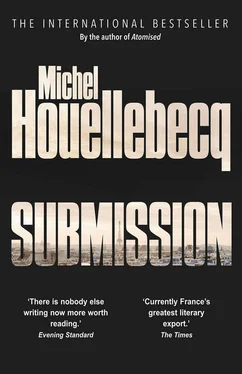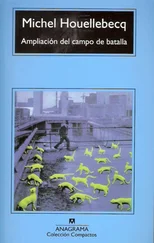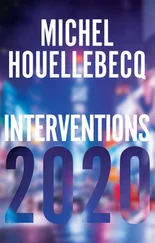In the old days, people lived as families, that is to say, they reproduced, slogged through a few more years, long enough to see their children reach adulthood, then went to meet their Maker. The reasonable thing nowadays was for people to wait until they were closer to fifty or sixty and then move in together, when the one thing their ageing, aching bodies craved was a familiar touch, reassuring and chaste, and when the delights of regional cuisine, as celebrated every Sunday on Les Escapades de Petitrenaud , took precedence over all other pleasures. For a while I sat there toying with the idea of writing an article for the Journal of Nineteenth-Century Studies in which I’d cite the proliferation of hit TV shows devoted to cooking, and in particular to regional cuisine, to argue that, after the long tyranny of modernity, Huysmans’ clear-eyed conclusions had come round again, and were more relevant than ever. Then I realised that I no longer had the energy or desire to write an article, even for a publication as under the radar as the Journal of Nineteenth-Century Studies . I also realised, with a kind of incredulous stupefaction, that the TV was still on, still tuned to iTélé. I turned on the sound: Marine Le Pen had given her speech hours ago, but all the pundits were still talking about it. She had called for a giant march on the Champs-Élysées. She had no intention of requesting a permit from the police, and if the authorities tried to interfere, she warned, the march would take place ‘by any means necessary’. She’d concluded with a quotation from the Declaration of the Rights of Man and of the Citizen, the one from 1793: ‘When the government violates the rights of the people, insurrection is for the people, and for each portion of the people, the most sacred of rights and the most indispensable of duties.’ Naturally, the word insurrection had provoked a fair amount of comment. It even drew François Hollande out of his years of silence. At the end of his second disastrous administration — having been re-elected only by pandering shamelessly to the National Front — the departing president had gone quiet, and the media seemed to have forgotten all about him. When he appeared on the steps of the Élysée, in front of the nine or ten journalists who showed up, and called himself the ‘last bastion of the republican order’, there was brief but clearly audible laughter. Ten minutes later, the prime minister issued his own response. Purple-faced, veins bulging in his forehead, he looked apoplectic, and he warned that those who tested the limits of democratic legality would be dealt with as criminals. In the end, the only one who kept his cool was Ben Abbes: he defended the right of free assembly and challenged Le Pen to a debate on secularism — which the pundits generally agreed was a clever move, since it was nearly impossible for her to say yes. So he emerged, at no special cost to himself, as the voice of moderation and dialogue.
In the end I got bored and wound up flipping back and forth between reality shows on obesity, then I turned off the TV. The idea that political history could play any part in my own life was still disconcerting, and slightly repellent. All the same, I realised — I’d known for years — that the widening gap, now a chasm, between the people and those who claimed to speak for them, the politicians and journalists, would necessarily lead to something chaotic, violent and unpredictable. For a long time France, like all the other countries of Western Europe, had been drifting towards civil war. That much was obvious. But until a few days before, I was still convinced that the vast majority of French people would always be resigned and apathetic — no doubt because I was more or less resigned and apathetic myself. I’d been wrong.
Myriam didn’t call until Tuesday evening, a little past eleven; her voice was bright and full of confidence in the future. She was sure things in France would sort themselves out before long. I had my doubts. She’d even managed to persuade herself that Nicolas Sarkozy would return to politics, and be greeted as a saviour. I didn’t have the heart to disabuse her, but that struck me as improbable in the extreme. I had the sense that Sarkozy was finished with politics, that after 2017 he’d moved on.
Her flight was early the next morning, so there’d be no time to see each other before she left; she had so much to do — she had to pack, for starters. It wasn’t easy to cram your whole life into thirty kilos of luggage. This was as I expected, but still I felt a pang as I put down the phone. I knew that now I’d be truly alone.
Yet I felt almost cheerful the next morning as I took the metro to my class. The events of the last few days, even Myriam’s leaving, seemed like a bad dream, a mistake that would be corrected soon enough. So I was taken aback when I got to the entrance of the building where my class was held, in the rue de Santeuil, and found that the gate was locked. The guards normally opened up at 7.45. Several students, including a few I recognised as my second years, stood waiting at the entrance.
It wasn’t until almost eight thirty that a guard emerged from the administration building, stood in front of the gate, and informed us that the university was closed today, and would be closed until further notice. There was nothing more he could tell us, we should go home and wait to be ‘contacted individually’. The guard was a black gentleman, Senegalese if I remembered right, whom I’d known for years and liked. As I was leaving, he took me by the arm and told me that, judging by the rumours among the staff, things were bad, really bad — he’d be extremely surprised if the university reopened in the next few weeks.
Maybe Marie-Françoise would know what was going on. I tried to reach her several times that morning, without success. Around one thirty I gave up and turned on iTélé. A lot of protesters had already shown up for the National Front march. Place de la Concorde and the Tuileries were thronged. According to the organisers there were two million people — the police said three hundred thousand. Either way, I’d never seen such a crowd.
A giant, anvil-shaped cumulonimbus cloud hovered over the north of Paris, all the way from the Sacré-Coeur to the Opéra, its sides a dark sooty grey. I looked over at the TV, where the huge crowd continued to gather, then I looked back at the sky. The storm cloud seemed to be moving slowly south. If it burst over the Tuileries, the demonstration would be seriously disrupted.
At exactly two o’clock, Marine Le Pen led the marchers down the Champs-Élysées towards the Arc de Triomphe, where she was scheduled to make a speech at three. I turned off the sound but went on looking at the screen. An immense banner stretched across the avenue, bearing the inscription ‘We Are the People of France’. Many of the demonstrators had been given small placards that read, more simply, ‘This Is Our Home’. That was the slogan they’d started using at extremist rallies — explicit, yet restrained in its hostility. The enormous cloud still hung there above the demonstration, motionless and threatening. After a few minutes I got bored and went back to En rade .
Marie-Françoise called a little after six; she didn’t have much news. The National Council of Universities had met the day before, but no one was talking. In any case, she was sure that the university wouldn’t reopen till after the elections — probably not until autumn. The exams could always be given in September. In general, the situation seemed serious. Her husband was visibly worried. For the past week he’d been spending fourteen-hour days at headquarters — he’d even slept there the night before. Before we hung up, she promised to let me know if she heard any news.
Читать дальше







